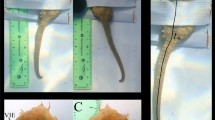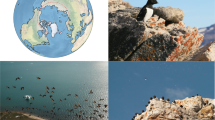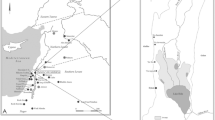Abstract
IN an earlier communication1, the first living record of an earless monitor lizard (Lanthanotus borneensis) from West Borneo was described. It was afterwards suggested that, despite the great rarity attached to it by previous authors2, the species might eventually prove to be overlooked rather than unknown3.
This is a preview of subscription content, access via your institution
Access options
Subscribe to this journal
Receive 51 print issues and online access
$199.00 per year
only $3.90 per issue
Buy this article
- Purchase on Springer Link
- Instant access to full article PDF
Prices may be subject to local taxes which are calculated during checkout
Similar content being viewed by others
References
Harrisson, T., and Haile, N. S., Nature, 190, 1213 (1961).
McDowell, S. H., and Bogert, Charles, M., Bull. Amer. Mus. Nat. Hist., 105, (1), 1 (1954).
Harrisson, T., Discovery (July 1961).
Harrisson, B., Sarawak Mus. J., 10, (17), 286 (1961).
Author information
Authors and Affiliations
Rights and permissions
About this article
Cite this article
HARRISSON, T. Earless Monitor Lizards in Borneo. Nature 198, 407–408 (1963). https://doi.org/10.1038/198407a0
Issue Date:
DOI: https://doi.org/10.1038/198407a0
Comments
By submitting a comment you agree to abide by our Terms and Community Guidelines. If you find something abusive or that does not comply with our terms or guidelines please flag it as inappropriate.



